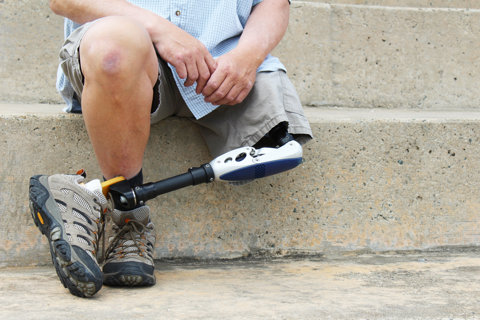Why Can Diabetes Lower Limb Conditions Lead to Amputations?
People with diabetes are at more risk of developing Peripheral Arterial Disease (PAD), which is when the vessels carrying blood from your heart to your legs become narrow.
This is one of the main reasons for lower limb amputations. Most of the time, diabetic amputations will be of the toe or foot, but there may be a need to amputate the leg in some severe cases.
Reduced blood flow can cause ulcers and sores on your legs, feet, and toes, and it can cause nerve damage meaning that you don’t feel any pain from these ulcers, so you would continue to naturally put weight on your foot.
The pressure from weightbearing together with a lack of treatment can lead to serious infections. Your condition makes it very difficult for your body to fight the infection, meaning ulcers may not heal sufficiently which can lead to tissue damage. If infections remain untreated, they can penetrate to the bones. Once an infection has penetrated the bone, the damage is irreversible and unfortunately, amputation is often the only option.
“One of NHS Resolution’s aims is to learn from incidents of harm and share learning as widely as possible. We hope this report will contribute to reducing the number of patients that suffer with severe diabetic lower limb complications.”
Helen Vernon, Chief Executive, NHS Resolution

Medical Negligence in Diabetes Lower Limb Amputations
In a report published in June 2022, the NHS admitted there were serious shortcomings in diabetes foot care. Sadly, 7957 major diabetic lower limb amputations were reported in England between 2017 and 2020. The NHS has reported that up to 85% of amputations are avoidable and that amputation is not an inevitable consequence of lower limb complications.
An amputation can have a devastating impact on your life, health, and wellbeing. There are a number of ways medical negligence can happen around diabetes lower limb care, which can result in otherwise unnecessary amputations, such as:
- Medical staff failing to properly identify and treat symptoms, misdiagnosing diabetes-related conditions, or not identifying high-risk patients.
- Delays in assessing for PAD and managing this – e.g., by recommending ways to relieve pressure on limbs.
- Long delays in being seen by a specialist footcare team once a diabetic foot problem is identified.
- An over-reliance on GPs who are not specialised – and a lack of training in diabetic lower limb care for medical professionals.
- Delay in diagnosis and improper treatment of infections such as sepsis, until it is unfortunately too late, and an amputation is the only option.
- Poor aftercare following surgery resulting in an infection.
You will need to prove that the actions of medical professional(s) who provided care to you caused the unnecessary need for amputation, or that medical professional(s)could (and should) have taken action to prevent deterioration (and subsequent need for amputation) Our Medical Negligence team are experts in this field, and will collect all the evidence we need to secure the best possible compensation for you.
How Could Medical Negligence Compensation Help Me?
We could help you claim thousands of pounds in compensation for financial losses relating to your diabetes amputation. Compensation can give you financial security for the rest of your life and justice for the substandard treatment you received.
We will establish what caused the need for amputation and consider how you are coping now, taking into account any support and care you require, and may need in the future.
So, what could you claim compensation for? Each case is considered on an individual basis, and we will take into account the following factors:
- Any unnecessary pain and suffering you experienced due to medical negligence – this can include pain caused by complications/infections, and any phantom pain or discomfort with prosthetic limbs you’re experiencing after your amputation.
- Any time you’ve taken off work, which has resulted in loss of earnings. You may even have future loss of earnings if you’re not sure whether you’ll be able to return to work at all. Compensation can pay for re-training if you need a job in a new industry that doesn’t involve being on your feet for too long.
- Money you’ve spent travelling to appointments or paying for prescriptions.
- Adaptations you might need to your home or car.
- Whether you’ll need any prosthetic limbs, rehabilitation or specialised aids and adaptations.
We also know how much of a huge psychological impact an amputation can have on your life. Amputations can be traumatic and if your condition got worse very rapidly, it’s possible that you are still finding it very hard to come to terms with what happened. It can be particularly devastating to know that something could (and should) have been done to prevent your amputation. Taking legal action might not be your first thought, but our dedicated Medical Negligence Solicitors are here to help you commence and throughout your claim. We can also help you access any therapy and/or treatment you might need.
Is There a Time Limit?
If you are a victim of medical negligence that has led to an amputation, you may be able to bring a claim for compensation. You will have 3 years from the date of your amputation to do this.
The only exceptions to this are if the amputation was performed on a child or someone who does not have mental capacity to litigate. Children who are eligible to claim have until their 21st birthday to commence Court proceedings, if their parent or guardian chooses not to while they are a minor.
Why You Should Choose Simpson Millar
Whether you experienced medical negligence at the GP, hospital, in the NHS or private healthcare, we could help you make a claim, as our lawyers have years of experience and a track record recovering significant amounts for you to get the support you deserve.
While compensation won’t change what happened to you, it can help you to re-build your life following your amputation. Our compassionate team are waiting to hear from you as soon as you are ready to discuss your case.
We understand that speaking to someone about what you’ve been through can be tough, so we’ll make the process as easy as possible for you. We’ll also only communicate with you in plain English, so you don’t have to worry about over-complicated legal jargon.
Get in touch with our expert team today for a Free Case Assessment. Your dedicated solicitor will listen to your story and determine how likely your case is to be successful. We’ll then outline all your legal options and discuss the best way forward to achieve the justice that you deserve.
We may be able to offer you a No Win No Fee Medical Negligence claim, meaning that you don’t pay a penny upfront, and don’t pay us any fees unless we win your case. Ask us for more information during your initial phone call.












